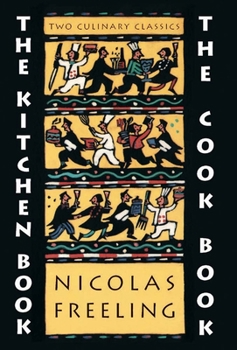The Kitchen Book & the Cook Book
Select Format
Select Condition 
Book Overview
For cooks who love to read, here are two gastronomical memoirs in one volume that are funny, wise, full of inspiration and delight.
Format:Paperback
Language:English
ISBN:0879238623
ISBN13:9780879238629
Release Date:September 2015
Publisher:David R. Godine Publisher
Length:360 Pages
Weight:0.97 lbs.
Dimensions:1.0" x 5.5" x 8.2"
Customer Reviews
2 ratings
Charming and Witty
Published by Thriftbooks.com User , 16 years ago
I found the book to be charming, written in a slightly old-fashioned, witty tone and filled with scraps of kitchen wisdom-- and plenty of tales of kitchen horror. It's literary, food-loving, and anyone who's ever worked in a kitchen will find themselves nodding with Freeling's character portraits and kitchen commentary. Highly recommended.
Culinary Adventures
Published by Thriftbooks.com User , 19 years ago
This volume consists of two works originally published by Freeling in the 1970s, "The Kitchen Book," and "The Cook Book." The two are presented here one after the other as separate entities, together with whimsical illustrations by John Lawrence. At the back of the book is an index covering material in "The Cook Book". "The Kitchen Book" describes Freeling's formative years as a cook in the 1950s and 60s. Freeling came of age in Britain at the close of World War II. He wanted to become a chef, and set off to the continent to find himself a job in a the restaurant of a fancy Parisian hotel. Determination and perseverance enabled him to withstand the rigors of an informal apprenticeship in the kitchen, where he learned the foundation of French cooking. Ambition and a desire for more pay led him to take a position in a provincial hotel, where he learned more, and not necessarily just about food. Much of the more interesting material in this volume covers this period in his life. The remainder covers his later cooking career, when he shifted from hotel to hotel in Britain, and presided as executive chef over a restaurant that was doomed from the start by fantastically poor management. Some of the material in the latter part of this volume can be slightly hard to follow for readers unfamiliar with the context of restaurant work in Britain or British dialects and slang. "The Cook Book" is a written in a very informal narrative style, quite different from the detailed didactic instructions of more typical cookbooks. Freeling enumerates the merits of a dish and how and when it may best be enjoyed, and then narrates entirely in prose how the dish can be prepared. He eschews exact measurements, temperature or timing guidelines, since he knows that ingredients are variable, and will cook differently depending on their age and treatment, and the humidity and temperature of the kitchen. He notes that it is far more important to observe, taste, smell, and touch the food as it cooks than to rely on measurements of volume, temperature, or time. Indeed, in the introduction to "The Kitchen Book," Freeling explains some of his philosophy on the subject, emphasizing that a good cook makes a dish well not through slavishly following a recipe, but through shear practice, and continuing to make the same dish repeatedly until it consistently comes out right. He tell us "In this book are no recipes, absolutely no useful hints, and above all no damned instructions; they do not give one an appetite." Actually, that's not quite true-a careful reader can pick up a number of great hints by reading the book, starting with the idea that good cooking comes through practice, not instructions. Nevertheless, Freeling's narrative style for giving recipes in "The Cook Book" is not for everyone. It works well for experienced cooks who are familiar with the ingredients mentioned. Such cooks won't have a problem with statements like "cook until done," but the rest






